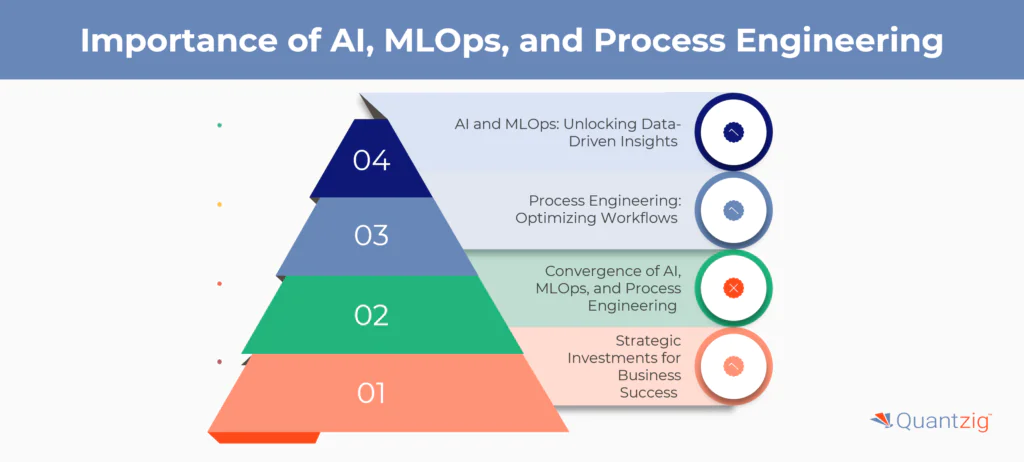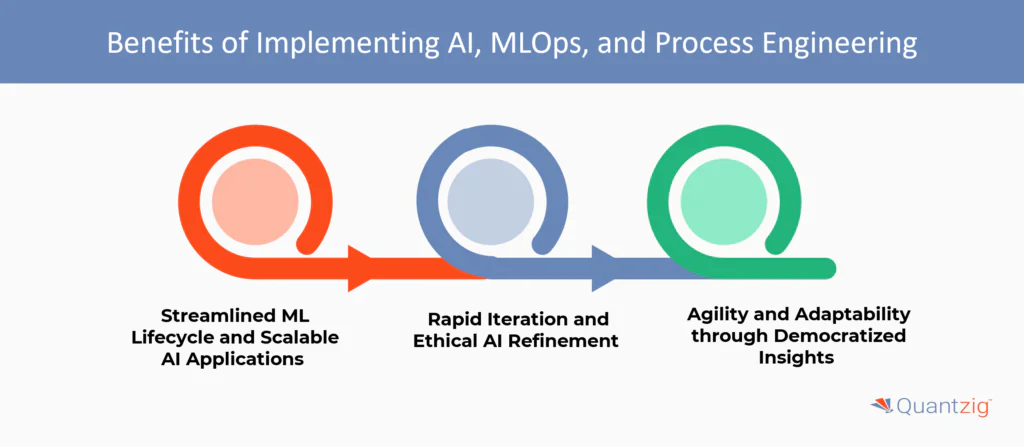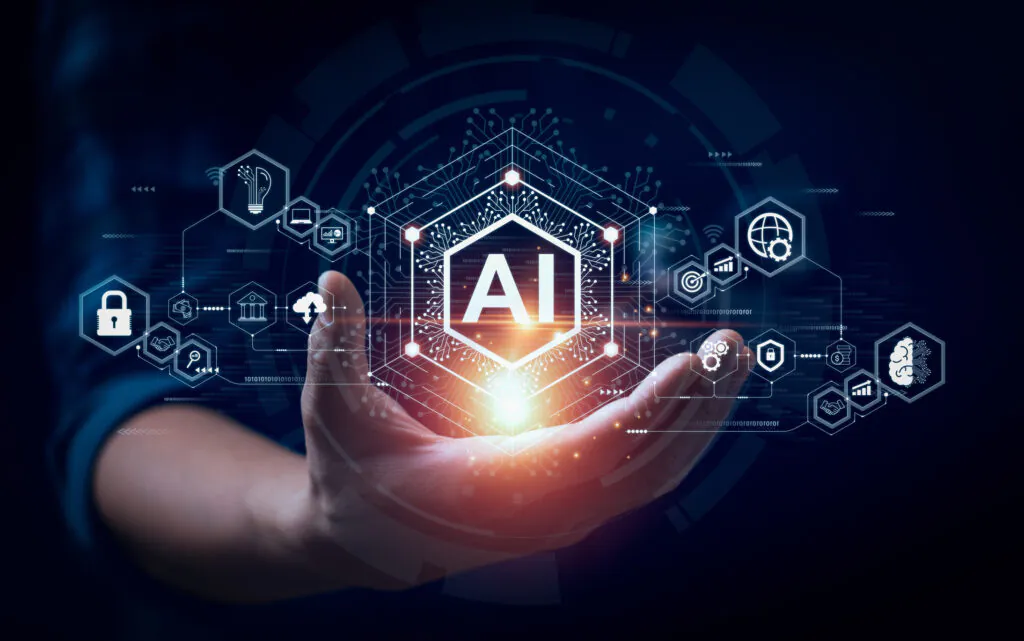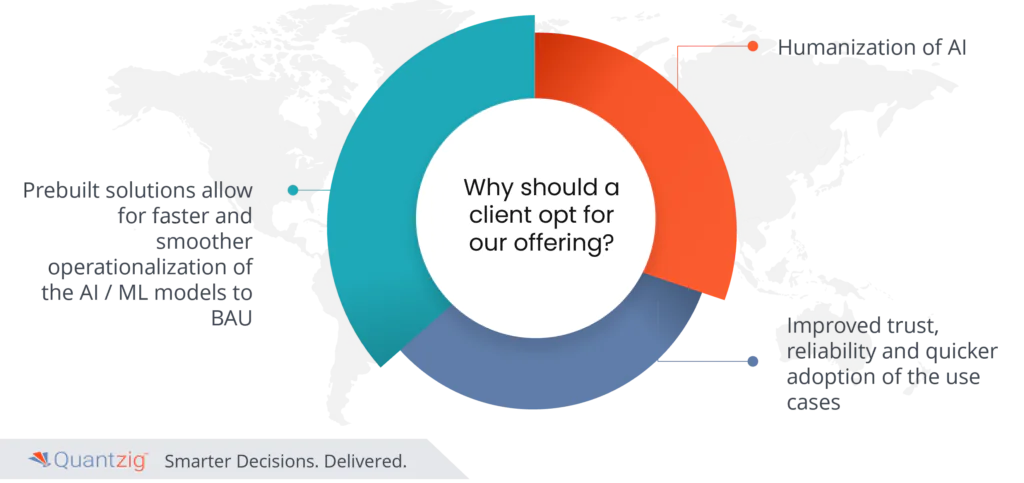Written By: Sudeshna Ghosh
Table of Contents
Table of Contents
- Introduction to MLOps Trends
- Importance of AI, MLOps, and Process Engineering
- Challenges/Problems Faced While Implementing AI, MLOps, and Process Engineering
- Benefits of Implementing AI, MLOps, and Process Engineering
- Top AI and MLOps Trends
- Why Should a Client Opt for Quantzig’s Offering?
- Conclusion
Introduction to MLOps Trends
In an era defined by relentless technological advancement, the nexus of AI, MLOps, and Process Engineering emerges as the crucible where innovation is forged. As we stand on the precipice of a digital revolution, it is imperative to recognize that the future of technology trends is not a passive entity but a dynamic masterpiece waiting to be crafted. This article delves into the intricate interplay of artificial intelligence, the operational finesse of MLOps, and the precision of process engineering, offering profound insights into how these elements converge to reshape our world. Join us on a journey into the heart of tomorrow’s tech landscape, where we explore the synergy that promises to redefine industries, empower businesses, and propel humanity toward unprecedented heights of progress and efficiency.
Request a demo to experience the meaningful insights we derive from data through our analytical tools and platform capabilities. Schedule a demo today!
Request a free demo
What is the Importance of AI, MLOps, and Process Engineering?

In today’s rapidly evolving technological landscape, businesses must remain agile and adaptable to stay ahead of the competition. This requires a strategic approach that integrates Artificial Intelligence (AI), Machine Learning Operations (MLOps), and Process Engineering. By leveraging these pillars, organizations can harness data-driven insights, streamline workflows, and optimize operational processes to drive efficiency and scalability.
1. AI and MLOps: Unlocking Data-Driven Insights
AI empowers businesses to harness data-driven insights, automate tasks, enhance decision-making processes, and enable predictive analytics. MLOps complements AI by establishing a framework for the efficient development, deployment, and management of machine learning models, ensuring they remain responsive and effective as conditions evolve. This synergy enables organizations to refine their AI applications through experimentation and ML testing, while AIOps and DataOps streamline operations and data management.
2. Process Engineering: Optimizing Workflows
Process Engineering optimizes workflows, ensuring that the organization’s operational processes are streamlined, efficient, and aligned with its strategic goals. This involves identifying and eliminating inefficiencies, automating repetitive tasks, and implementing scalable solutions. By integrating Process Engineering with AI and MLOps, organizations can create a seamless and efficient operational environment that supports business growth and innovation.
3. Convergence of AI, MLOps, and Process Engineering
The convergence of AI, MLOps, and Process Engineering is shaping the future of innovation. Organizations are embracing cutting-edge technologies like OpenAI’s GPT-4 for advanced natural language processing (NLP) and optimizing ML lifecycles with Cloud-Native MLOps solutions like SageMaker and Vertex AI. DevOps practices facilitate seamless integration of software development and ML systems, while responsible AI frameworks ensure ethical and transparent AI applications.
4. Strategic Investments for Business Success
CIO and CDO organizations recognize the critical importance of these pillars and are strategically investing in them. These investments enable companies not only to stay competitive but also to lead in an era where innovation and adaptability are paramount. By prioritizing data engineering, application integration, and the adoption of hybrid AI models, organizations are poised to revolutionize industries and shape the future of technology.
In today’s rapidly evolving technological landscape, the convergence of AI, MLOps, and Process Engineering represents a paradigm shift in how businesses operate and innovate. By embracing these methodologies, organizations can unlock the full potential of their data, navigate complex challenges, and chart a course towards sustainable growth and success in the digital era.
Challenges/Problems Faced While Implementing AI, MLOps, and Process Engineering

The convergence of Artificial Intelligence (AI), Machine Learning Operations (MLOps), and Process Engineering is transforming the way businesses operate and innovate. However, implementing these methodologies can be challenging, especially for organizations that are new to AI and ML. This article highlights the key challenges and provides strategies for overcoming them.
1. Challenges in AI and MLOps Implementation
AI and MLOps implementation can be complex and challenging, especially for organizations that are new to AI and ML. Some of the key challenges include:
- Data Quality and Availability: Ensuring high-quality and available data is crucial for AI and ML models. However, data quality and availability can be a significant challenge, especially for organizations that are new to AI and ML.
- Model Interpretability and Explainability: AI and ML models can be difficult to interpret and explain, which can make it challenging for organizations to understand how the models are making decisions.
- Model Deployment and Maintenance: Deploying and maintaining AI and ML models can be challenging, especially for organizations that are new to AI and ML.
2. Challenges in Process Engineering
Process Engineering can also be challenging, especially for organizations that are new to AI and ML. Some of the key challenges include:
- Process Complexity: Process Engineering can be complex, especially for organizations that have multiple processes and systems.
- Process Integration: Integrating processes and systems can be challenging, especially for organizations that have multiple systems and processes.
- Process Automation: Automating processes can be challenging, especially for organizations that are new to AI and ML.
3. Strategies for Overcoming Challenges
To overcome the challenges in implementing AI, MLOps, and Process Engineering, organizations can use the following strategies:
- Data Quality and Availability: Ensure high-quality and available data by implementing data quality and availability strategies.
- Model Interpretability and Explainability: Implement model interpretability and explainability strategies to ensure that AI and ML models are transparent and explainable.
- Model Deployment and Maintenance: Implement model deployment and maintenance strategies to ensure that AI and ML models are deployed and maintained effectively.
- Process Complexity: Simplify process complexity by implementing process simplification strategies.
- Process Integration: Implement process integration strategies to ensure that processes and systems are integrated effectively.
- Process Automation: Implement process automation strategies to ensure that processes are automated effectively.
Implementing AI, MLOps, and Process Engineering can be challenging, especially for organizations that are new to AI and ML. However, by understanding the key challenges and using the strategies outlined in this article, organizations can overcome these challenges and successfully implement AI, MLOps, and Process Engineering.
What are the Benefits of Implementing AI, MLOps, and Process Engineering?

Harnessing the combined power of AI, MLOps, and process engineering delivers unparalleled benefits for businesses striving to thrive in today’s dynamic landscape. These transformative methodologies not only optimize operational efficiency but also mitigate risks and unlock new opportunities, revolutionizing how organizations operate and innovate.
1. Streamlined ML Lifecycle and Scalable AI Applications
By integrating cutting-edge technologies like OpenAI’s GPT-4 and advanced ML frameworks such as SageMaker and Vertex AI, and leveraging Cloud-Native MLOps and serverless architectures, businesses can streamline their ML lifecycle and ensure seamless deployment and scalability of AI applications across diverse environments.
2. Rapid Iteration and Ethical AI Refinement
The implementation of DevOps principles alongside DataOps practices facilitates the seamless integration of software development and data engineering, enabling rapid iteration and experimentation. Additionally, the use of responsible AI frameworks and ML testing helps organizations uphold ethical standards while refining their AI applications for optimal performance and reliability.
3. Agility and Adaptability through Democratized Insights
One of the key advantages of this holistic approach is its ability to democratize access to critical insights and decentralize decision-making. By empowering stakeholders with real-time data and actionable insights, businesses can foster agility and adaptability, enabling swift responses to emerging trends and risks.
The convergence of AI, MLOps, and process engineering represents a paradigm shift in how businesses operate and innovate. By embracing these methodologies, organizations can unlock the full potential of their data, navigate complex challenges, and chart a course towards sustainable growth and success in the digital era.
Experience the advantages firsthand by testing a customized complimentary pilot designed to address your specific requirements. Pilot studies are non-committal in nature.
Request a Free PilotWhat are the Top AI and MLOps Trends?

The top AI and MLOps trends are being shaped by the integration of DevOps and DataOps practices into machine learning workflows, leveraging advanced platforms such as Vertex AI and Databricks. The use of Kubernetes for scalable ML Cloud infrastructure is becoming increasingly popular, as are end-to-end Machine Learning Operations platforms that streamline the entire lifecycle from model deployment and serving to model observability. Both open-source MLOps tools and closed-source platforms are being utilized to ensure flexibility and security. Additionally, the emphasis on Responsible AI practices and the rise of AIOps for automating IT operations with AI are significant trends in the field.
1. Responsible AI Governance and AI Risk Management Frameworks:
With the proliferation of AI applications across industries, ensuring ethical and responsible AI deployment has become paramount. Organizations are adopting AI risk management frameworks to mitigate potential biases, address transparency concerns, and uphold ethical standards. Integrating principles of fairness, accountability, and transparency (FAT) into AI development processes not only enhances trust but also minimizes regulatory risks associated with AI usage.
2. MLOps and DevOps Convergence for Seamless ML Lifecycle Management:
In the realm of Software Development and AI innovation, OpenAI has been a prominent figure, especially with breakthrough models like GPT-4 pushing the boundaries of Natural Language Processing (NLP). However, alongside such advancements come challenges, hence the necessity for an AI Risk Management Framework to ensure ethical and effective deployment.
Enterprises leverage ML Cloud services for scalable and efficient management of ML systems. Utilizing Containers, they package and deploy models swiftly, facilitating seamless integration with existing infrastructure through Application Integration.
3. Cloud-Native MLOps and the Rise of Managed ML Platforms:
Leveraging cloud-native MLOps solutions, such as SageMaker and Vertex AI, enables organizations to harness the scalability, flexibility, and cost-efficiency of cloud environments for ML workflows. These managed ML platforms offer end-to-end capabilities for data preparation, model training, deployment, and monitoring, empowering teams to focus on innovation rather than infrastructure management. Embracing cloud-native architectures facilitates seamless integration with serverless computing and containerization technologies, enhancing agility and enabling rapid experimentation in ML projects.
4. Advancements in ML Testing and Experimentation:
As ML systems grow increasingly complex, robust testing and experimentation methodologies are essential to ensure model reliability, performance, and safety. AI-driven testing tools, including ML testing frameworks and AutoML solutions, help organizations validate models across diverse data distributions and edge cases. Additionally, adopting techniques from natural language processing (NLP) enables automated testing of ML models’ language understanding capabilities, enhancing their robustness in real-world scenarios.
5. Hybrid AI and the Convergence of DataOps and AIOps:
Hybrid AI approaches, combining traditional machine learning techniques with advanced deep learning models, are gaining traction for addressing complex business challenges. This trend necessitates a convergence of DataOps and AIOps practices to ensure seamless data management, monitoring, and optimization of AI applications. By integrating AI-driven insights into operational processes, organizations can enhance decision-making, optimize resource utilization, and drive efficiencies across diverse domains, from IT operations to customer service.
6. AI Oversight and Responsible ML Governance:
With increased scrutiny on AI ethics and accountability, organizations are prioritizing AI oversight and implementing frameworks for responsible ML governance. Executive orders and policy initiatives are driving the conversation, emphasizing the importance of transparency, fairness, and accountability in AI deployment. By embracing responsible AI practices, businesses can mitigate risks, build trust, and ensure compliance with regulatory standards, fostering sustainable AI adoption.
7. MLOps Revolution and Model Operations Automation:
The MLOps revolution is reshaping the landscape of model operations, emphasizing automation, collaboration, and scalability. Leveraging Kubernetes-based solutions and low-code tools, organizations streamline model deployment, monitoring, and management, accelerating time-to-market and reducing operational overhead. Through cross-team collaboration and rapid iteration, businesses optimize model performance, driving efficiency and scalability in AI deployments.
8. Multimodal Learning and Vision-Speech-Time Series Integration:
The rise of multimodal learning enables AI systems to process and analyze diverse data types, including vision, speech, and time series data. Federated learning and federated model operations facilitate enterprise adoption by enabling organizations to leverage distributed data sources while ensuring data privacy and compliance. By integrating vision, speech, and time series capabilities, businesses unlock new opportunities for AI applications in areas such as predictive maintenance, healthcare, and finance.
9. Low/No-Code MLOps and Lite Model Deployment:
Low/no-code MLOps platforms empower ML artisans to streamline model operations without extensive coding expertise, democratizing AI deployment across organizations. Lite model deployment techniques, supported by Kubernetes-based solutions like KFServing and MLSDF, enable efficient deployment and scaling of lightweight AI models in cloud-native environments. By embracing low/no-code tools and lightweight deployment strategies, businesses enhance agility, scalability, and cost-efficiency in AI deployments.
10. AI Revolution and Sustainable Scalable Adoption:
Despite challenges, AI continues to revolutionize industries, driving sustainable and scalable adoption across organizations. By integrating AI with cloud-native environments and embracing responsible AI practices, businesses unlock new opportunities for innovation and growth. Cross-team collaboration, coupled with robust experiment tracking and monitoring, facilitates rapid iteration and optimization, ensuring the success of AI initiatives in today’s dynamic business landscape.
As AI and machine learning continue to reshape industries, organizations must embrace these trends to unlock new opportunities, drive innovation, and maintain a competitive edge. By prioritizing responsible AI governance, adopting cloud native MLOps solutions, and embracing advancements in testing and experimentation, businesses can navigate the evolving landscape with confidence and harness the transformative power of AI for sustainable growth.
What our Capability does?

Our visual workflow manager is a specialized tool designed for efficient data ingestion and comprehensive data cataloging, enhanced by a potent Metadata editor. This combination empowers organizations to establish a robust Data Quality Management (DQM) process. It’s capable of seamlessly handling data from disparate, discrete, and siloed sources, effectively streamlining data operations. By providing a unified platform for data management, it enables improved data governance, simplifies data integration, and ensures data reliability, regardless of its source.
Our MLOps solutions play a crucial role in enhancing the integrity and effectiveness of machine learning models. These solutions introduce traceability and reproducibility by maintaining consistency in ML model development. They offer continuous audit trail capabilities, manage exceptions efficiently, and enforce rigorous process governance and compliance standards. This not only boosts the trustworthiness of ML models but also ensures that organizations can confidently navigate regulatory requirements and maintain the highest standards of quality in their AI and machine learning initiatives.
Why should a Client Opt for Our Offering?

- Prebuilt solutions play a pivotal role in expediting the operationalization of AI/ML models, seamlessly integrating them into everyday business operations and critical processes. They offer a swift and efficient path to transition from development to full-scale deployment, minimizing the time and effort required for implementation. By providing ready-made frameworks and tools, these solutions enable organizations to harness the power of AI and ML at a faster pace, ensuring a smoother transition to business-as-usual (BAU) operations. This accelerated adoption not only saves valuable resources but also allows businesses to reap the benefits of AI/ML more rapidly, gaining a competitive edge in their respective industries.
- Our solutions facilitate the humanization of AI, bridging the gap between advanced technology and human interaction. By enhancing the user experience and making AI more approachable, they contribute to improved trust and reliability in AI-driven applications. This, in turn, accelerates the adoption of AI use cases across various domains. By making AI more user-friendly and understandable, organizations can foster greater confidence in their workforce and customers, driving quicker acceptance and integration of AI technologies into everyday processes. Ultimately, this human-centered approach enhances the effectiveness and success of AI implementations.
Get started with your complimentary trial today and delve into our platform without any obligations. Explore our wide range of customized, consumption driven analytical solutions services built across the analytical maturity levels.
Start your Free TrailConclusion:
In the ever-evolving landscape of technology, the convergence of AI, MLOps, and Process Engineering emerges as a transformative force. As we’ve explored the intricate interplay of these pillars, it becomes evident that they are the keystones of innovation and adaptability. The future belongs to those who embrace this synergy, forging a path toward greater efficiency, agility, and competitiveness. By crafting robust strategies, organizations can navigate the complexities of the digital age with confidence, harnessing the power of data-driven insights, intelligent automation, and streamlined processes. The journey is ongoing, but the destination promises a future where technology not only empowers us but also reshapes industries and propels humanity toward unprecedented heights of progress.


